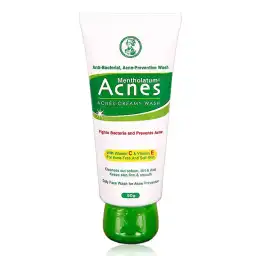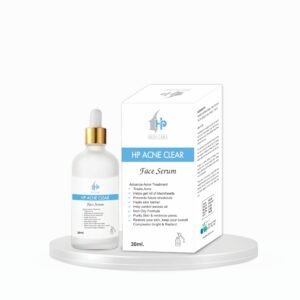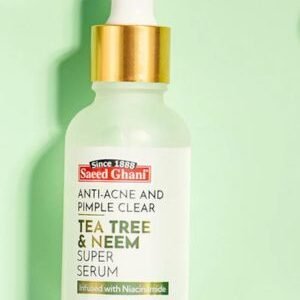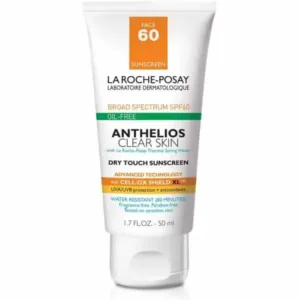Need help? Call us:
03254920193
Acnes Creamy Wash
₨900.00 Original price was: ₨900.00.₨850.00Current price is: ₨850.00.
🔥 Buy More Save More!
Buy 3 items get 5% OFF
on each productBuy 6 items get 10% OFF
on each productBuy 10 items get 15% OFF
on each productHave any Questions?
Feel free to Get in touch
Acnes Creamy Wash is a facial cleanser formulated to help manage acne. It typically contains ingredients designed to cleanse the skin deeply, remove excess oil, and help prevent breakouts. Common active ingredients in such products might include salicylic acid, which helps to exfoliate the skin and clear out pores, or other acne-fighting agents like benzoyl peroxide.
The “creamy” aspect usually means it’s designed to be gentle on the skin, providing moisture while cleaning, which can be beneficial for those with sensitive or dry skin prone to acne.
If you have any specific questions about the product, such as its ingredients or how to use it effectively, let me know!
Sure! Here’s a bit more about how to use and what to expect from Acne’s Creamy Wash:
Usage Instructions
1. Cleanse Twice Daily: For best results, use the creamy wash twice a day—once in the morning and once before bed.
2. Apply to Wet Skin: Moisten your face with lukewarm water, then apply a small amount of the cleanser to your fingertips or a washcloth.
3. Massage Gently: Gently massage the cleanser into your skin using circular motions, focusing on areas prone to breakouts.
4. Rinse Thoroughly: Rinse thoroughly with lukewarm water to ensure all product residue is removed.
5. massage Dry: Using a fresh towel, gently massage your face dry.
Benefits
Deep Cleansing: Helps remove dirt, oil, and impurities that can clog pores and lead to acne.
Moisturizing: The creamy texture can help keep your skin hydrated while cleansing.
Acne Prevention: Active ingredients target acne-causing bacteria and help reduce inflammation.
Potential Side Effects
Dryness or Irritation: If you have sensitive skin, be mindful of potential dryness or irritation.Try a tiny amount at first to see how your skin responds.
Allergic Reactions: Always perform a patch test before using a new product extensively to ensure you don’t have an adverse reaction to any of the ingredients.
Complementary Products
Toners: After cleansing, you might use a toner to balance the skin’s pH and further reduce oiliness.
Moisturizers: Use a non-comedogenic (won’t clog pores) moisturizer to keep your skin hydrated.
Spot Treatments: For persistent breakouts, consider spot treatments with targeted acne-fighting ingredients.
If you have any specific skin concerns or conditions, consulting with a dermatologist can help tailor your skincare routine to your individual needs.
Additional Tips for Using Acne’s Creamy Wash
1. Consistency is Key: Regular use is crucial for seeing improvements. Stick to a routine and avoid skipping applications.
2. Avoid Over-Cleansing: Using the product more than twice a day can strip your skin of essential oils and potentially worsen dryness or irritation. Stick to the recommended usage.
3. Patch Test: Before using any new product extensively, do a patch test on a small area of your skin to ensure you don’t have an allergic reaction.
4. Avoid Mixing: Be cautious about combining multiple acne treatments.Your skin may become irritated if you use multiple acne products at once. If you’re using other treatments, consult with a dermatologist on the best approach.
Understanding Ingredients
Salicylic Acid: This common acne-fighting ingredient helps exfoliate the skin, unclog pores, and reduce inflammation.It works especially well for whiteheads and blackheads.
Benzoyl Peroxide: Another common ingredient in acne products, it helps kill acne-causing bacteria and reduce oiliness.
Glycolic Acid: Sometimes included in creamy washes, it helps exfoliate the skin’s surface and improve texture.
When to See Results
Initial Changes: Some users might see improvements in their skin within a few weeks, but it can take up to 6-8 weeks to see significant changes.
Patience Required: Acne treatments often take time to show results, so be patient and continue using the product as directed.
Additional Skincare Tips
Hydration: To keep your skin moisturized from the inside out, sip lots of water.
Sun Protection: Use sunscreen daily, especially if using acne treatments that can make your skin more sensitive to the sun.
Healthy Diet: A diet high in fruits, vegetables, and whole grains that is well-balanced can promote the general health of your skin.
Avoid Touching Your Face: Minimize touching your face with your hands to reduce the spread of bacteria and oil.
If you experience persistent issues or if the product causes excessive irritation, it’s a good idea to consult with a dermatologist to explore other options or adjust your skincare routine.
Related products
HP Acne Clear Serum
Hp Acne Clear Facewash
ANTI ACNE CLEANSER
Tea tree anti acne serum
La Roche-Posay Dry Touch Sunscreen
You may add any content here from XStore Control Panel->Sales booster->Request a quote->Ask a question notification
At sem a enim eu vulputate nullam convallis Iaculis vitae odio faucibus adipiscing urna.










Reviews
There are no reviews yet.